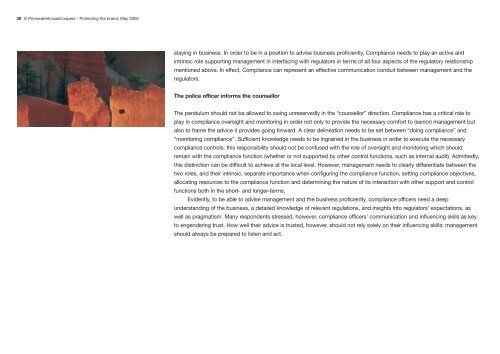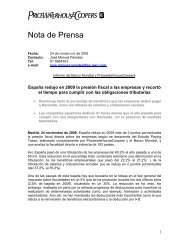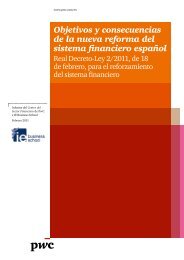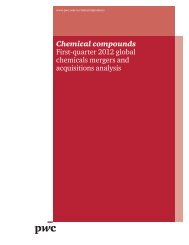Compliance Study_complet - pwc
Compliance Study_complet - pwc
Compliance Study_complet - pwc
Create successful ePaper yourself
Turn your PDF publications into a flip-book with our unique Google optimized e-Paper software.
38 © PricewaterhouseCoopers - Protecting the brand, May 2005<br />
staying in business. In order to be in a position to advise business proficiently, <strong>Compliance</strong> needs to play an active and<br />
intrinsic role supporting management in interfacing with regulators in terms of all four aspects of the regulatory relationship<br />
mentioned above. In effect, <strong>Compliance</strong> can represent an effective communication conduit between management and the<br />
regulators.<br />
The police officer informs the counsellor<br />
The pendulum should not be allowed to swing unreservedly in the “counsellor” direction. <strong>Compliance</strong> has a critical role to<br />
play in compliance oversight and monitoring in order not only to provide the necessary comfort to (senior) management but<br />
also to frame the advice it provides going forward. A clear delineation needs to be set between “doing compliance” and<br />
“monitoring compliance”. Sufficient knowledge needs to be ingrained in the business in order to execute the necessary<br />
compliance controls: this responsibility should not be confused with the role of oversight and monitoring which should<br />
remain with the compliance function (whether or not supported by other control functions, such as internal audit). Admittedly,<br />
this distinction can be difficult to achieve at the local level. However, management needs to clearly differentiate between the<br />
two roles, and their intrinsic, separate importance when configuring the compliance function, setting compliance objectives,<br />
allocating resources to the compliance function and determining the nature of its interaction with other support and control<br />
functions both in the short- and longer-terms.<br />
Evidently, to be able to advise management and the business proficiently, compliance officers need a deep<br />
understanding of the business, a detailed knowledge of relevant regulations, and insights into regulators’ expectations, as<br />
well as pragmatism. Many respondents stressed, however, compliance officers’ communication and influencing skills as key<br />
to engendering trust. How well their advice is trusted, however, should not rely solely on their influencing skills: management<br />
should always be prepared to listen and act.

















